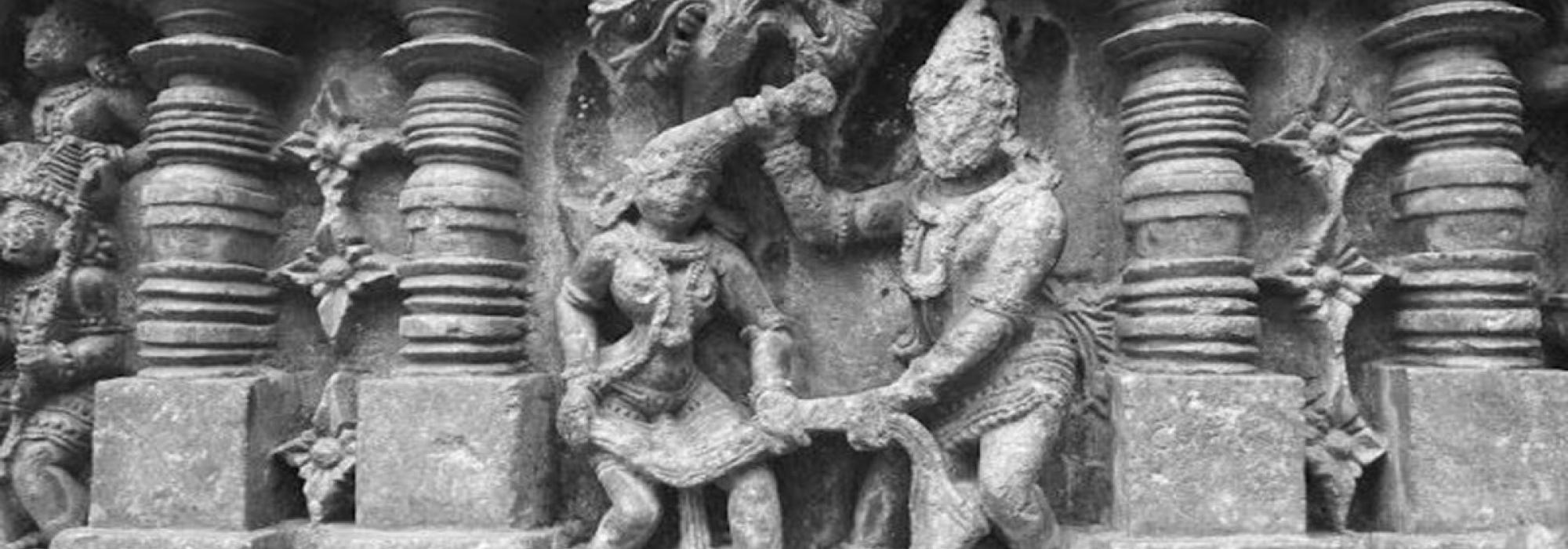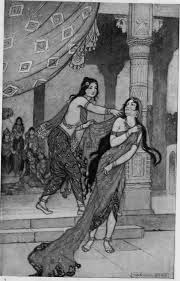Vidura’s advice fell on deaf ears. Śakuni said to Dharmarāja, “Yudhiṣṭhira, you’ve lost a lot of wealth. Tell us if there is something you haven’t yet lost!”
Yudhiṣṭhira replied, “I know how much of wealth I have – my riches are immeasurable. Why do you ask, Śakuni? I can pledge any amount I want – ayuta, prayuta, padma, arbuda. śaṅkha, nikharva, samudra [1], anything..!”
Śakuni threw the dice and said, “Look! I won!” Yudhiṣṭhira lost a large number of cows, goat, and sheep. He also lost a lot of land – cities and villages of his kingdom. He then went ahead to pledge the ornaments that his brothers wore. His brothers, Nakula and Sahadeva, were pledged next. He lost them too! Śakuni said, “Ah! So you’ve lost even Mādrī’s sons! Why don’t you consider pledging Bhīma and Arjuna too? Are they so great that they can escape the game of dice?”
Yudhiṣṭhira was irritated. “Idiot! You’re up to no good. This is all adharma! You have given up ethics! You are trying to bring disharmony amongst the brothers!” Śakuni said, “A drunkard naturally falls into a pit; he becomes like a dead log! You are the oldest and the most respected one, Yudhiṣṭhira. Thus, here, my salutations to you. Gamblers prattle; their words don’t make sense to us even in reams!” Arjuna was then pledged and lost. Bhīma was lost too. Yudhiṣṭhira then pledged himself on the next game. He lost himself to the Kauravas as well. Śakuni then said, “When you still have something that is yours, you’ve put yourself to gamble and lost it! Isn’t this too much of an injustice? Losing oneself is a great sin. You have your queen, don’t you? You have not brought her into the game at all! So I suggest you pledge Pāñcālī – she might win you back everything you have lost!” Yudhiṣṭhira said, “Yes, what you say is right, Śakuni. I shall pledge my dear wife, Draupadī who is beautiful and of good character.”
The elders shrunk in disgust upon listening to Yudhiṣṭhira’s words. They said, “Fie! Fie!” The assembly was disturbed. Everyone assembled there spoke amongst themselves in whispers; Bhīṣma and Droṇa’s bodies were wet with sweat. Vidura held his head in his arms, sighed, and looked as though he had fainted. Only Dhṛtarāṣṭra was excited and could not control his happiness. He kept asking, “Did he win? Did he not?” Karṇa, Śakuni, and the others were thrilled too. Several others were in tears. Śakuni rolled the dice, without a second thought and declared – “Look here, I won!” Duryodhana then asked Vidura, “Dear Vidura, please bring Draupadī, the dear wife of the Pāṇḍavas, to this assembly! Let her stay with the other female servants and clean the house; that will surely make us all happy!” Vidura said, “You fool! How can you even think in this way? Don’t you see the noose hovering over your head? You are kindling the Pāṇḍavas’ anger just as a deer provokes a tiger! Don’t provoke the poisonous snake that is waiting to sting you. Yudhiṣṭhira pledged Draupadī when he had lost himself. He was no longer independent when he pledged her! She does not become a dāsī; gamble fosters great enmity and disaster. We should not hurt others with harsh words. We should never assassinate his character by taking to unethical ways. When our language loses its control, it causes great pain to people on whose ears it falls. Thus, a learned person should never speak such words, There is nothing venerable for a person who behaves like a dog; he only howls with a vulgar tongue. He barks at everyone – a citizen or a forester, a foreigner or a wise person – without discretion. You are listening to my words of advice. In the near future, stones will float on water, boats will lose their way in the waters – Kauravas will meet their end. Words of wisdom fall on the deaf ears of the Kauravas; their greed has no limit!” Duryodhana heard these words and ridiculed Vidura. He called Pratikāmī and said, “You go, get Draupadī, Pratikāmī! You are not afraid of the Pāṇḍavas! Vidura is always so – he fears the Pāṇḍavas and tries to advice me. He does not like us to prosper.” As per Duryodhana’s orders, Pratikāmī went to the queen’s quarters just as a lion enters a cave and said, “Draupadī! Yudhiṣṭhira had lost his senses while gambling and Duryodhana has won you. So come, be a servant in Dhṛtarāṣṭra’s house. I will take you there!”
Draupadī said, “What are you speaking, Pratikāmī! How can someone pledge his wife in a gamble? Yudhiṣṭhira had lost his mind while gambling but did he not have anything else to pledge?” Pratikāmī said, “Yes, he was left with nothing and this is the reason he put you to gamble! He had lost his brothers and himself by then! He then lost you too.” Draupadī said, “Pratikāmī! Go to the assembly and ask those gamblers – did he lose me first or did he lose himself? You may then take me!” He went to Dharmarāja and questioned him. Dharmarāja sat as though he had lost his breath. He did not speak for or against the matter. Duryodhana then said, “Let Pāñcālī come here and ask him! Everyone else here will hear her question and his reply too!” Accordingly, Pratikāmī went back in distress and said, “Oh revered lady! The gamblers want you to come there! Seems like Kauravas are close to destruction; it does not seem like they have any concern for your dignity – they don’t care if it puts your nobility to a shame there!” Draupadī said, “Difficulties befall the fool and the learned alike. He should experience both. Such is fate and the divine acts. Dharma is the greatest of all on earth. Protecting Dharma will bring peace.” In the mean time, Duryodhana sent a messenger to Draupadī. As she was in her menses, Draupadī wore only a single piece of garment. She came weeping in the single raiment she wore and stood before Dhṛtarāṣṭra in the assembly. Looking at her, Duryodhana said, “Pratikāmī! Bring her here; let her listen to what the Kauravas say!” Pratikāmī was in a fix; he could not disobey Duryodhana’s words, but at the same time, he was worried that Draupadī would get enraged. Confused, he asked, “What should I tell Kṛṣṇā?” Duryodhana could not stand this. He called Duśśāsana and said, “This son of a sūta is timid and seems to fear Bhīma. Go, drag her and bring her here. What can the Pāṇḍavas do to you even if they are angry?” The next moment, Duśśāsana went to her and said, “Come Pāñcālī, come! We have won you! Don’t feel shy – look at Duryodhana! Serve the Kauravas; we have righteously won you. Come to the assembly!” Draupadī was in great distress; she turned pale and was sweating. She wiped her face with her hands and ran towards the quarters where Dhṛtarāṣṭra’s queens stayed. Duśśāsana roared and rushed after her. She held her by her long hair that was like a black snake. Duśśāsana held the long tresses that were sanctified in the Rājasūya-yāga. It seemed as though the valour of the Pāṇḍavas was defeated. He pulled her to the assembly, treating her like a lady orphaned by her husband. Draupadī said in a voice full of pain, “You brute! I am impure today and I’m wearing a single garment. I cannot come to the assembly!” Even after listening to her words, he exerted great force on her tresses and said “Your purity or your garments don’t matter to us! You have been won over in the gamble; you are now our dāsī! Dāsīs should always be available to us!” Her hair got dishevelled in this fight and her garment slipped. In such a state, an embarrassed Draupadī said with rage, “Everyone assembled here is well-versed in the śāstras. Elders, gurus, and learned men are here; I cannot stand in their presence in my current state. Even if the demigods come to your support along with Indra, the Pāṇḍavas won’t spare them. It appears to me that the lineage of Bharata has lost its ethics and its kṣatriya-dharma!” with these words, Draupadī looked at the Pāṇḍavas with sorrowful eyes. The Pāṇḍavas, who were fuming with rage now started to burn with fury. Her look caused them such intense pain that they had never felt before – not while giving away all their wealth or their kingdom. Draupadī looked at her helpless husbands, who seemed to be lifeless.
Duśśāsana pulled her again with force “Hey Dāsī!” Karṇa and Śakuni were thrilled listening to Duśśāsana’s words. They let out a boisterous laugh and encouraged Duśśāsana. Except for Duryodhana and the other two, the rest in the assembly were greatly pained looking at the sorry state Draupadī was in. Bhīṣma said, “Dear child! It is hard to understand dharma – it is a delicate matter. It is subtle, nuanced. Thus, I’m unable to answer your question. A person who is not free cannot pledge anything that belongs to him; but a wife is always under the control of her husband. Yudhiṣṭhira might have lost all his wealth, but he never gives up on truth; he has agreed that he has lost himself to the Kauravas. No one can control Śakuni when he gets into gamble and Yudhiṣṭhira let him have his course; he did not realise that it was deceit. Thus, I can’t answer your question, child!
Draupadī replied, “When all the cheats and deceivers have united and have brought Dharmarāja to this state out of their sinful deeds, why do we need to bank on his wish? He did not even try to get into all this – he is a noble soul. He knows no deceit or cunning. When everyone got together to defeat him, he had to pledge different things. There are elders in this assembly, who have sons and daughters-in-law. I request you all to ponder over my question and answer me!”
Footnote:
[1] Different measures for numbers used in ancient India


















































